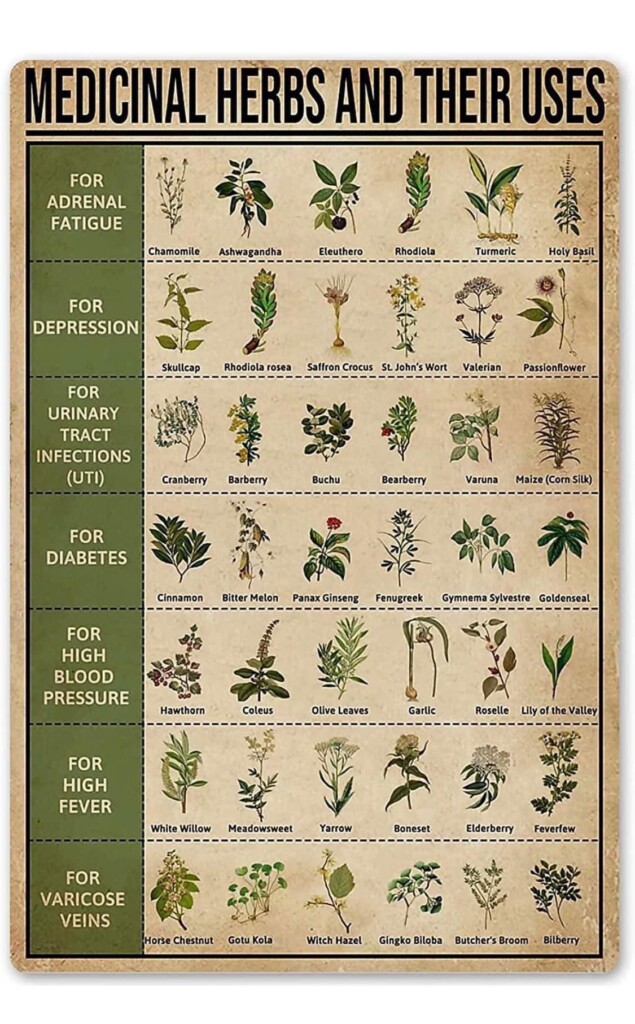For millennia, humans have turned to nature for remedies and treatments for various ailments. Long before the advent of modern medicine, herbs were the primary source of healing, and many of today’s pharmaceuticals have their roots in these ancient botanical remedies. This article delves into the vast world of medicinal herbs and their myriad uses.

1. Echinacea (Echinacea purpurea)
Uses: Echinacea is renowned for its immune-boosting properties. It’s often used to prevent or shorten the duration of the common cold and flu. Additionally, it has anti-inflammatory effects and can help with wound healing.
2. St. John’s Wort (Hypericum perforatum)
Uses: This herb is best known for its potential in treating mild to moderate depression. Some studies suggest it might be as effective as certain antidepressant drugs. It’s also used for anxiety, insomnia, and wound healing.
3. Turmeric (Curcuma longa)
Uses: The active ingredient in turmeric, curcumin, has potent anti-inflammatory and antioxidant properties. It’s used for arthritis, digestive disorders, and even as a potential treatment for Alzheimer’s disease.
4. Ginger (Zingiber officinale)
Uses: Ginger is a versatile herb used for nausea, especially in pregnancy and after chemotherapy. It also has anti-inflammatory properties and can help with pain management.
5. Ginkgo Biloba
Uses: Ginkgo is often used to improve memory and cognitive function. It’s believed to increase blood flow to the brain and has antioxidant properties.
6. Milk Thistle (Silybum marianum)
Uses: This herb is a powerhouse for liver health. It’s used to treat liver disorders and protect the liver from toxins. The active compound, silymarin, has antioxidant and anti-inflammatory properties.
7. Valerian (Valeriana officinalis)
Uses: Valerian is a natural remedy for insomnia and anxiety. It acts as a sedative on the brain and nervous system.
8. Lavender (Lavandula angustifolia)
Uses: Lavender is used for its calming and relaxing effects. It’s beneficial for anxiety, insomnia, depression, and digestive issues.
9. Peppermint (Mentha piperita)
Uses: Peppermint is used to treat digestive problems, including irritable bowel syndrome. The menthol in peppermint also makes it effective for headaches when applied topically.
10. Chamomile (Matricaria recutita)
Uses: Chamomile is a gentle remedy for various ailments, including insomnia, digestive issues, and skin conditions. It’s also used for its anti-inflammatory and anti-anxiety effects.
11. Saw Palmetto (Serenoa repens)
Acupressure Points for Migraine Relief: Natural Techniques to Alleviate Pain
Uses: This herb is commonly used for prostate health, particularly benign prostatic hyperplasia (BPH). It can help reduce the size of the prostate gland and alleviate symptoms.
12. Aloe Vera
Uses: Aloe vera is best known for its skin-soothing properties. It’s used to treat burns, sunburns, and skin irritations. Internally, it can help with digestion.
13. Elderberry (Sambucus nigra)
Uses: Elderberry is used for its antiviral properties, especially against the flu. It can help boost the immune system and shorten the duration of illness.
14. Hawthorn (Crataegus monogyna)
Uses: Hawthorn is a heart herb. It’s used to treat heart disease, improve cardiovascular function, and control high blood pressure.
15. Licorice Root (Glycyrrhiza glabra)
Uses: Licorice is used for digestive issues, including ulcers and acid reflux. It also has anti-inflammatory effects and can help with respiratory problems.
16. Dandelion (Taraxacum officinale)
Uses: Every part of the dandelion is medicinal. It’s used as a diuretic, for liver detoxification, and for digestive issues.
17. Garlic (Allium sativum)
Uses: Garlic is used for cardiovascular health. It can help lower blood pressure, reduce cholesterol, and has antiviral and antibacterial properties.
18. Feverfew (Tanacetum parthenium)
Uses: Feverfew is used primarily for migraine prevention. It can reduce the frequency and severity of migraines.
19. Black Cohosh (Actaea racemosa)
Uses: This herb is used for women’s health, particularly menopausal symptoms like hot flashes and mood swings.
20. Bilberry (Vaccinium myrtillus)
Uses: Bilberry is used for eye health. It can improve night vision and protect against eye diseases like macular degeneration.
The world of medicinal herbs is vast and varied. These plants, with their myriad of uses, serve as a testament to the healing power of nature. However, it’s essential to approach herbal medicine with caution. Not all herbs are safe for everyone, and they can interact with medications or other herbs. Always consult with a healthcare professional or herbalist before starting any herbal treatment. With knowledge and respect, herbs can be a valuable part of a holistic approach to health and well-being.
As an Amazon Associate we earn from qualifying purchases through some links in our articles.




